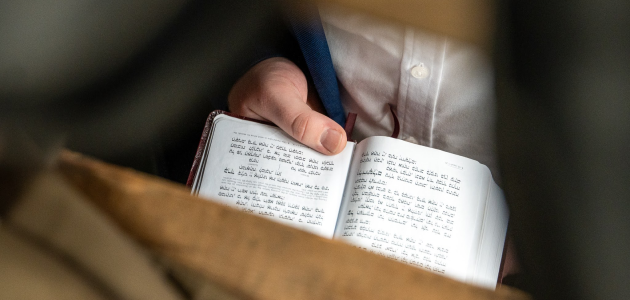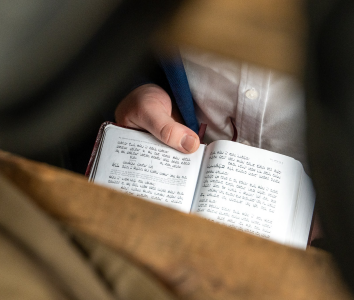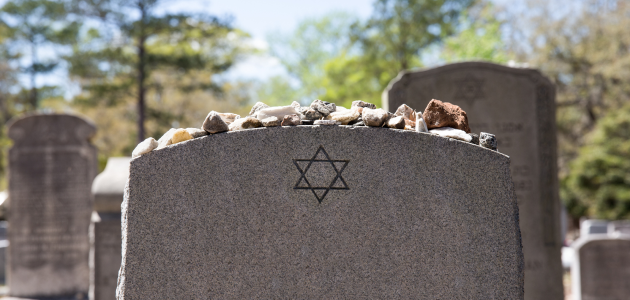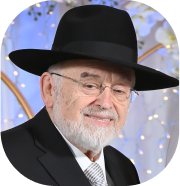Home » Legacy Giving » Practical Guides to Planning Death in Jewish Tradition
Practical Guide
to Jewish
Death
Traditions
From planning a funeral to Jewish mourning customs, end-of-life planning doesn’t need to be overwhelming when you have clear guidance and information.
Jewish death traditions approach the end of life
with the idea that death is a transition.
It’s when a person’s eternal soul moves from
this world to the Next World, which means that while the body dies, the soul lives on.
This idea guides all end-of-life planning and Jewish death customs, which focus on honoring the deceased and bringing merit to the soul. From bedside customs and prayers to planning a Jewish funeral burial for a loved one, dealing with death according to Jewish death traditions can be extremely meaningful.
With all the information you need about Jewish death traditions provided in the following guides, you can feel prepared to face end-of-life issues knowing that you’re following a roadmap for the ultimate respectable Jewish death. Consult the following guides for clarity and purpose in handling all issues related to Jewish death traditions and customs.


Leaving Instructions for Jewish Funeral Traditions
Find out how to make arrangements for your Jewish funeral
In this guide:
- Why make an end-of-life plan for Jewish funeral traditions (and all the benefits of doing so)
- 6 categories of Jewish death instructions (plus whom to consult)
- Jewish ideas about perpetuating your memory and values


Jewish Rituals for Death at the Bedside
Here’s how to properly accompany a Jewish patient through death
Judaism provides guidance for every aspect of life, even during the period of preparing for imminent death. By following Jewish customs for death, one’s last days of life can be filled with purpose. Following these Jewish traditions can help family members and loved ones feel that they’ve done their absolute best for their dying relative to die peacefully. Family members can find clear guidance in Jewish law about how to treat a dying person properly and the many Jewish death rituals that honor and give respect to the deceased.
In this guide:
- Asking forgiveness at a dying person’s bedside
- Jewish ideas about the death transition (and how this can be a comfort)
- Guidance about keeping the patient comfortable vs. prolonging life


Deathbed Prayers in Accordance with Jewish Death Traditions
Read this to access all the prayers for a dying Jewish person
For a patient on their deathbed, there are specific Jewish prayers to recite that are a merit for the dying person’s soul. Saying these prayers are a source of comfort before death, and serve as a way to prepare for meeting one’s Creator.
In this guide:
- When to say Jewish prayers for death
- The Jewish Viduy (confessional prayer) in text and audio recording
- Psalms to say before death in text and audio recording
- How to handle the final moments in Jewish death traditions


Guide to Funeral and Jewish Shiva Traditions
Read this for help planning a Jewish funeral for a loved one and complying with Jewish shiva traditions for mourning
Not sure what to do immediately after a loved one dies? With a little guidance and a consultation with a rabbi, anyone can plan a proper Jewish funeral following all the Jewish death traditions. It’s your last big chance to honor your family member and show appreciation, so doing it in a respectable, Jewish way shows your love and is a true good deed.
- Which family members are included in Jewish mourning obligations (and what those are)
- Steps to planning a Jewish funeral
- 7 steps to mourning according to Jewish shiva customs (plus explanations for how to fulfill them)
- 4 steps to take when distributing a loved one’s asset
In all aspects of planning Jewish death, there are meaningful rituals and customs to be aware of. When death is approached from a Jewish perspective, comfort, reassurance, and clarity accompany every step of the process.
Bringing honor to the deceased is a central way to find comfort upon death. This can be done through any of the Jewish traditions that are a merit for the departed, especially that of giving charity and reciting Kaddish in their memory.

RMBH Charities offers programs that assist family members in bringing merit to departed loved ones, such as their Kaddish and learning program. All charity that is donated to RMBH Charities supports worthy causes such as the poor in Israel, impoverished families, and special needs children. Leaving a legacy gift to Rebbe Meir Baal Haness charities is another wonderful way to keep your connection to a loved one who dies, or to ensure a lasting legacy as merit for yourself.
We’re Here to Help


 Turn Your Legacy
into a Source of Blessing
Turn Your Legacy
into a Source of Blessing
 Guide to Jewish
End-of-Life Planning
Guide to Jewish
End-of-Life Planning Guide to Types of Bequests:
Choosing the Right Option
Guide to Types of Bequests:
Choosing the Right Option 
